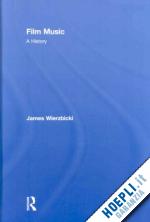Part One: Music and the "Silent" Film (1894–1927) Chapter One: Origins, 1894–1905 Chapter Two: The Nickelodeon, 1905–1915 Chapter Three: Feature Films, 1915–1927 Part Two: ‘Classic’ Film Music (1927–1950) Chapter Four: The Coming of Sound (1927–1929) transition: Edison’s ideas Early technologies (pre-1927) (Edison, De Forester, etc.) Anticipations of a great future (Carl Van Vechten, George Antheil, etc.) Problems of amplification, synchronization Vitaphone: "Don Juan," "The Jazz Singer," etc. Other systems and their costs, usefulness, adaptations, etc. The immediate effect on the industry (cite numbers of installations, but also note persistence of ‘silent’ films in Japan, etc.) transition: the lines/scene from 1953 "Singin’ in the Rain" ??? Chapter Five: Early Sound Films (1929–1933) transition: the original "Singin’ in the Rain’ The fad for musicals (cite the numbers) "Steamboat Willie" (the Disney innovations) anti-musical, pro-musical industry shifts ca. 1931 (draw from all the extra research done for the Gershwin article in JAMS) Approaches/aesthetics: wall-to-wall music vs. no music at all vs. only diegetic music (mention the various approaches in USSR, England, France, Germany, Italy, etc.) Early commentary in the trade press (on sound in general, on musicals, on music, on ‘theme songs’) transition: negative commentary on "theme songs" Chapter Six: Music in the Classical-Style Hollywood Film (1933–1950) transition: the reference to ‘theme song’ in "King Kong" Max Steiner and "King Kong," "The Informer" (biographical info; earlier efforts) (info on how the "KK" score came about) Definitions of "classical" style (cite Gorbman, Kalinak, Bordwell, Flinn, etc.); then offer a better definition/discussion of the idea of the ‘classical’ film; lead up to the idea of ‘classical’ = standardization Standardization of genres Standardization of gestures: Standardization of production: The composers (individuals, certainly, but holding to a standardized approach nevertheless): Stothart, Waxman, Korngold, Kaper, Carl Stallings, Newman, Rozsa, Webb, Donan, Herrmann, etc. (their early accomplishments; their backgrounds; studio-director affiliations; basic approaches/styles …) Standardization of distribution: transition: post-war troubles for the ‘studio system’ (the coming of television, the Supreme Court decision for divestiture, the gross revenue tax ca. 1952) Part Three: Film Music in the Post-Classic Period (1950–2000) Chapter Seven: Post-War Innovations; Struggle for Survival (1950–1960) transition: disastrous economic effects on the studio system Hollywood reaction: breakdown of ‘studio system’; epics, musicals, Technicolor, 3-D, Cinerama The first "soundtrack albums" in the early 1950s (LPs) The close relationship between Hollywood and Broadway The rise of inexpensive scores (Ronald Stein for the Roger Corman films, etc. …) Introduction of pop music and jazz ("Blackboard Jungle," teen rock movies, Elvis films, etc.) The sci-fi genre and electronic music ("Forbidden Planet," "Them!", "The Day the Earth Stood Still" and many more) (but back up and deal with "Spellbound" (1945), "The Lost Weekend" (1945) and other theremin scores …) Best-selling songs ("High Noon" (1952); Henry Mancini …) Jazzy scores like "On the Waterfront" (1954), "Baby Doll" (1956), "Anatomy of a Murder" (1959), "The Man with the Golden Arm" (1955) Hitchcock-Herrmann: "Vertigo" (1958), "North by Northwest" (1959), "Psycho" (1960) Epics: "Ben-Hur" (1959), "The Alamo," "Spartacus" (1960) : epic scores, w. overture, entr’acte, exit music. transition: budget considerations vs. a need to compete with television Chapter Eight: Eclecticism (1960–1980) transition: restrictions = opportunity ??? big themes, big songs: "Dr. No" (1962) (certainly this features a "big" song in the main titles …); "Born Free" (1966), "Lawrence of Arabia" (1962), "The Way We Were" (1973) (the first film to feature a "big" song in the end credits????) weird stuff: "The Birds" (1963), "The Andromeda Strain" (1971) "THX 1138: (1971) Kubrick and eclecticism: "Lolita" (1962), "Dr. Strangelove" (1964) "2001: A Space Odyssey" (1968), "A Clockwork Orange" (1971) "To Kill a Mockingbird" (1962) compilation scores: "The Graduate" (1967), "Easy Rider" (1969), "American Graffiti" (1973) mixture scores (i.e., pop with classic style): "Butch Cassidy and the Sundance Kid" (1969) ‘modernist’ scores: "Jaws" (1975), "Apocalypse Now" (1979), "Planet of the Apes" (1968) rebirth of the classic-style score: "Star Wars" (1977), "Close Encounters of the Third Kind" (1977), "Superman" (1978), "Raiders of the Lost Ark" (1981), "E.T. – the Extraterrestrial" (1982) [of course, these are all by John Williams; what about the other composers who jumped on the neo-classic bandwagon?] issues: the compilation score, the re-birth of the classic-style score transition: on to the postmodern age Chapter Nine: (1980–2000) New Definitions and New Uses of Film Music transition: define the "postmodern" as eclectic, non-linear, referential, etc. raises the question: what, exactly, is film music, anyway? What is a film score? mention the rise of technology that allows a composer to concoct a quasi-full score in a home studio (MIDI, sequencers, sound modules, ProTools, etc.) note rising interest in sound effects as music … note the new role of the ‘music supervisor’ (i.e., the acquirer of licensed materials …) "The Terminator" (1984) "Die Hard" (1988) Michael Kamen, James Horner, Jerry Goldsmith, Hans Zimmer, Danny Elfman Diverse examples: "The Terminator" (1984), "Die Hard" (1988), "Dirty Dancing" (1987), "Edward Scissorhands" (1990), "Thelma and Louise" (1991), "The Thin Red Line" (1998), "The Gladiator" (2000) transition: so, where are we heading? Epilogue: (the twenty-first century) On the one hand, films like "Harry Potter" and "Lord of the Rings" suggest a return to tradition On the other hand, things, like "Moulin Rouge" (2001), "Run, Lola, Run" (1998), "Kill Bill" (2003) suggest an embrace of the "postmodern condition" by the film audience (at least, by the younger members thereof)











